The Secret to More Energy, Less Anxiety, and a Thriving Career? Let Emma Seppälä Show You the Way
January 18, 2019 | Filed in: Woman of the Week
We all know meditation is supposed to be good for us. And after you spend a few minutes with psychologist Emma Seppälä, you’ll actually want to do it. As the science director for the Stanford Center for Compassion and Altruism, a co-director at the Yale Center for Emotional Intelligence, and author of The Happiness Track, Emma has spent years researching simple ways to improve mental health and well-being. Here’s how she practices what she preaches.
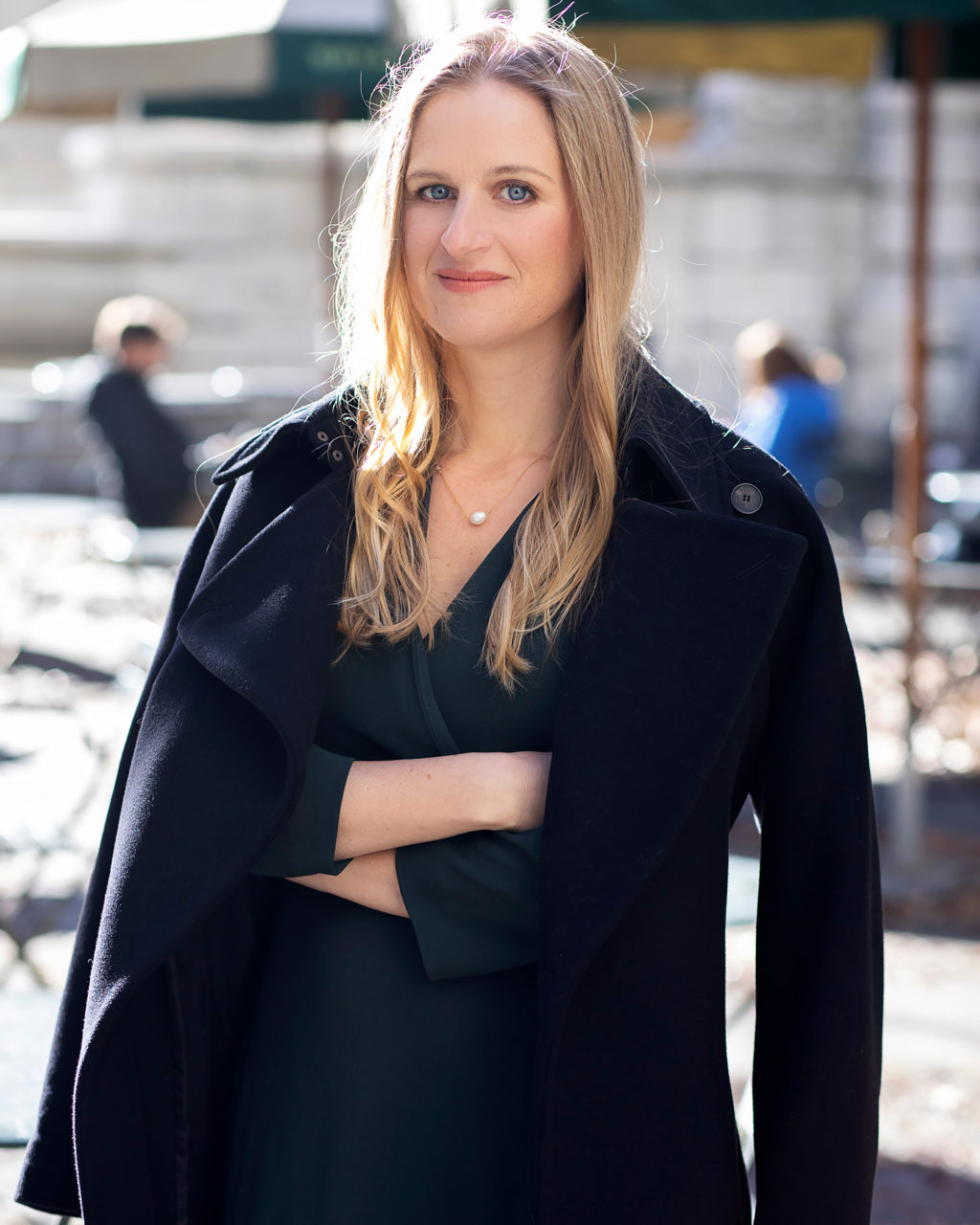
Emma wears the Niko dress, Vivara necklace, Sofia coat, and Lana boots.
GROWING UP, I DIDN’T HAVE A CAREER PLAN except to do what I liked doing. I was privileged in that my parents gave us an education. That came with a sense of responsibility to make a difference, but I wasn’t sure what that would be. In college, I studied literature. After I graduated, I spent two years in China working and studying. Then I got a master’s degree in East Asian studies to learn more about Asian philosophy and culture, which led me to psychology and meditation. I thought that researching meditation could have real-world outcomes that would help people.
I STARTED DABBLING IN MEDITATION IN COLLEGE in the ‘90s, when it was really weird to meditate. But it had a big impact on me right away. At the time, I had an eating disorder where I would eat to the point of feeling unwell. That was how I handled my emotions when I felt down. I only decided to try a meditation class because a guy I had a crush on was doing it, and I wanted to spend time with him. So I went to a session and sat for an hour. It was excruciatingly painful and I thought I’d never do it again in my life. The next day, I was feeling down and I saw a leftover pizza that someone had left in the dorm. I thought, Here is my moment. I can binge. But I then I thought, Emma, you always binge and then you cry. Why don’t you cry first and then binge second? So I went to bed and cried, and when I was done crying, I didn’t need to binge anymore. Just one meditation session had opened a new space in my mind, and a feeling of freedom entered. That was the end of my eating disorder.
I ARRIVED IN NEW YORK to start my master’s program at Columbia the day after 9/11, and in the months following, I would have anxiety attacks every morning around 8:30 A.M. I couldn’t sit still when I tried to be mindful or meditate during those anxious moments. It was too overwhelming. I tried many different things to get a handle on it, and eventually I found a breathing practice that worked when I followed it with meditation.
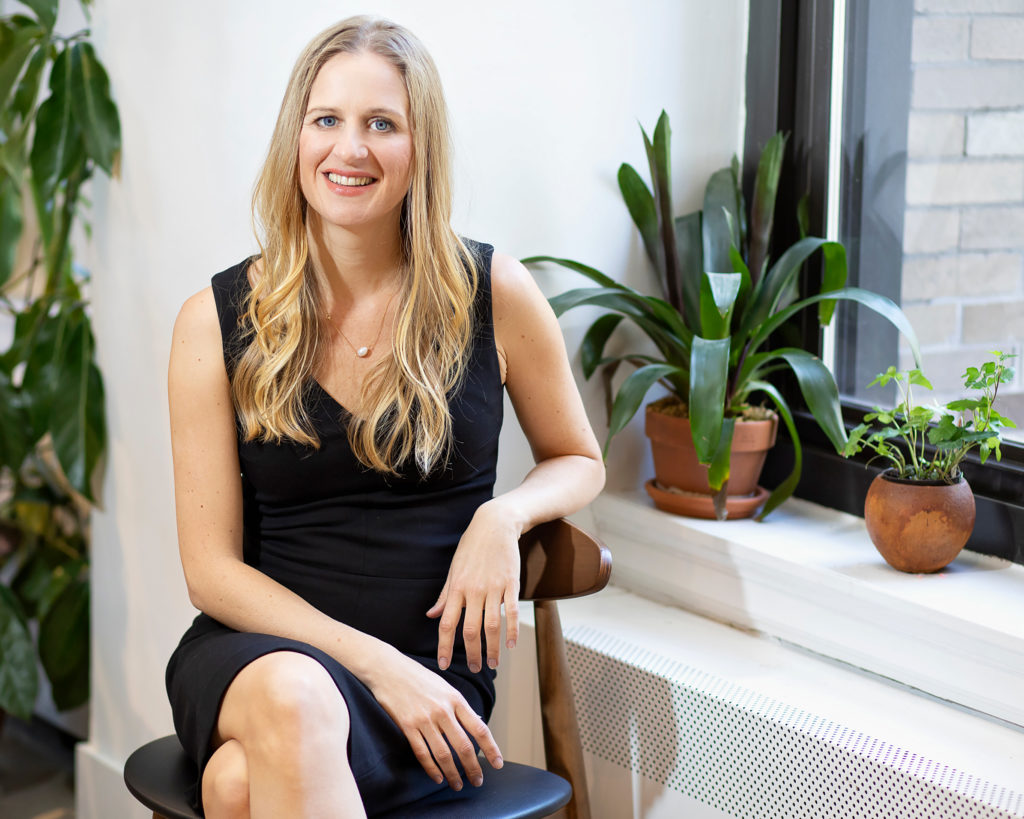
Emma wears the Rachel dress, Vivara necklace, and Lana boots.
I WENT ON TO RESEARCH THE EFFECTS of breathing exercises for post-traumatic stress disorder. I conducted a large study on it with veterans coming home from war. These veterans had tried everything—medication, therapy—and nothing had worked. But after just one week of following this breathing program, they didn’t qualify as having PTSD anymore. The results remained the same one month later, and one year later, which suggested long-term, even permanent change. It was one of the most meaningful discoveries of my life. I’m still friends with many of the people who participated in that research and I even officiated at the weddings of several of them.
AM I A MINDFUL PERSON? I DON’T KNOW. I have a one-year-old and a four-year-old. It’s very difficult to be mindful if you take away sleep and add a bunch of stress. But I stick to my practices every single day for an hour. I try to be authentic and live by my values. If I feel like crying and there are other people around, I’m still going to cry. I don’t hide anything. There’s nothing I can do about it if other people aren’t comfortable with who I am.
BEING TRUE TO YOURSELF IS A TRITE EXPRESSION, but listening to your own needs is very powerful. Being myself means listening to my inner voice. For example, if I go to an event and realize I don’t feel like being there, I can either stay and explore my feelings about it, or I can leave. It also means saying no sometimes. I’ll receive an offer for something and then see how it sits. For example, I was given an offer to either be on the Yale faculty or to be a contractor. Even though being on the faculty sounded more glamorous and official, I ultimately decided to be a contractor because it gave me more flexibility. We all have intuition. The more we meditate, the more we become aware of our intuition.
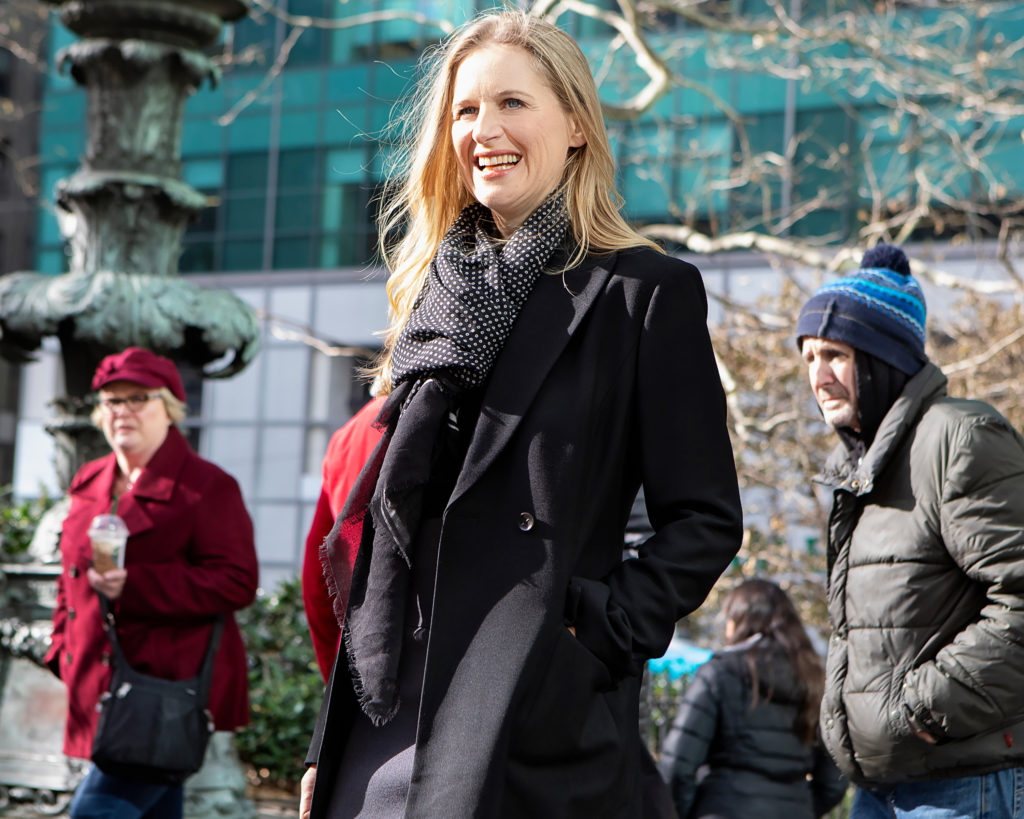
Emma wears the Cheryl coat, Royal Checker scarf, Harlem skirt, and Octavia top.
WE GET WARNING SIGNALS ABOUT SITUATIONS, about people, about things. But we are often taught to shut them off. We think, I should just do what everybody else is doing or I really should just listen to the expert. The truth is, sometimes you know best.
AFTER MY FIRST KID, I HAD ABOUT 60 PERCENT OF THE ENERGY I’d had beforehand. Now, after my second, I’m probably at 30 percent. I got a second book contract, and I recently returned the check and the contract. I said, “At this time, I can’t do it. I’m working at Yale and I have two children and I need to rest whenever I have time. I’m going to do that until I can be 100% again.” For me, there was no sadness in returning that check and contract. If the time is supposed to come again, it will. And if it’s not, it won’t and that’s fine. I will write anyway.
I GREW UP IN FRANCE, WHERE YOU DON’T HAVE TO BE NICE. It’s considered a little weird. In France, you are nice when you feel like it because you’re enjoying an interaction, which is very different from American culture. I appreciate American niceness, but it also creates situations where people don’t know how to say no. In France, the first thing people say is no. It’s almost funny. You have to build a serious relationship with someone before they say yes to you.
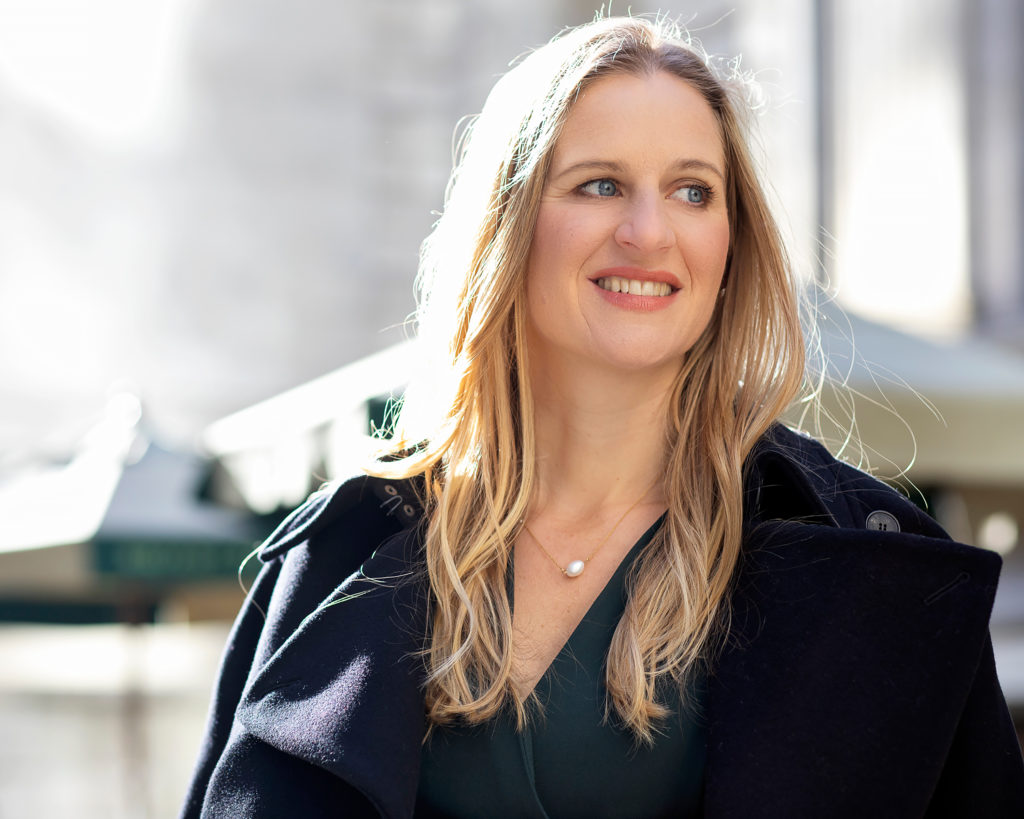
Emma wears the Niko dress, Vivara necklace, Sofia coat, and Lana boots.
THE MORE I HONOR MY OWN NEEDS, the more I find that there are no missed opportunities—there are just additional opportunities that come later. When I started to honor my health, and rested more and said no more often, I found that huge opportunities began coming my way. Then I could select what I wanted and almost make up my job as I went along. It sounds like magical thinking, but I took it as a sign that it’s okay to let go. In fact, sometimes when you strive too much, it blocks the flow of things.
ESPECIALLY IN THE UNITED STATES, PEOPLE GRIP THEIR WORK so tightly, to the point that it becomes feverish. I was in the Bay Area and I kept meeting these serial entrepreneurs who had a constant need to keep striving to an extreme level. Of course, it’s always great to want to do more cool stuff. But when you think there’s going to be some kind of reward at the end, which you never reach, it gets to be too much. We know this from research: If there’s genuine happiness and enthusiasm, then awesome, go for it. But when you’re pushing and driving and draining yourself, that’s when you will fall out of balance.
WHY IS IT SO HARD TO MEDITATE? When most people sit down, they have the same reaction that I did when I tried to meditate after 9/11—I had so much stuff going on in my head. You’re thinking, My to-do list is going through the roof. I’m anxious and agitated, and this sucks, and I’m done. Right? But that’s part of the process; just sit there. Set a timer for 10 minutes or 20 minutes. Guided meditation is helpful, because there’s someone telling you what to do, which helps you relax and let go a bit more (I use an app called Sattva). Of course, exercise can help with meditation because you get your wiggles out, just like a kid. A lot of us are just sitting around all day and then sitting some more, so our bodies are agitated.
IN ADDITION TO MEDITATING, I DO A BREATHING EXERCISE every day. I learned the technique through an organization called Art of Living, and I’ve made an online video that people can use, too.
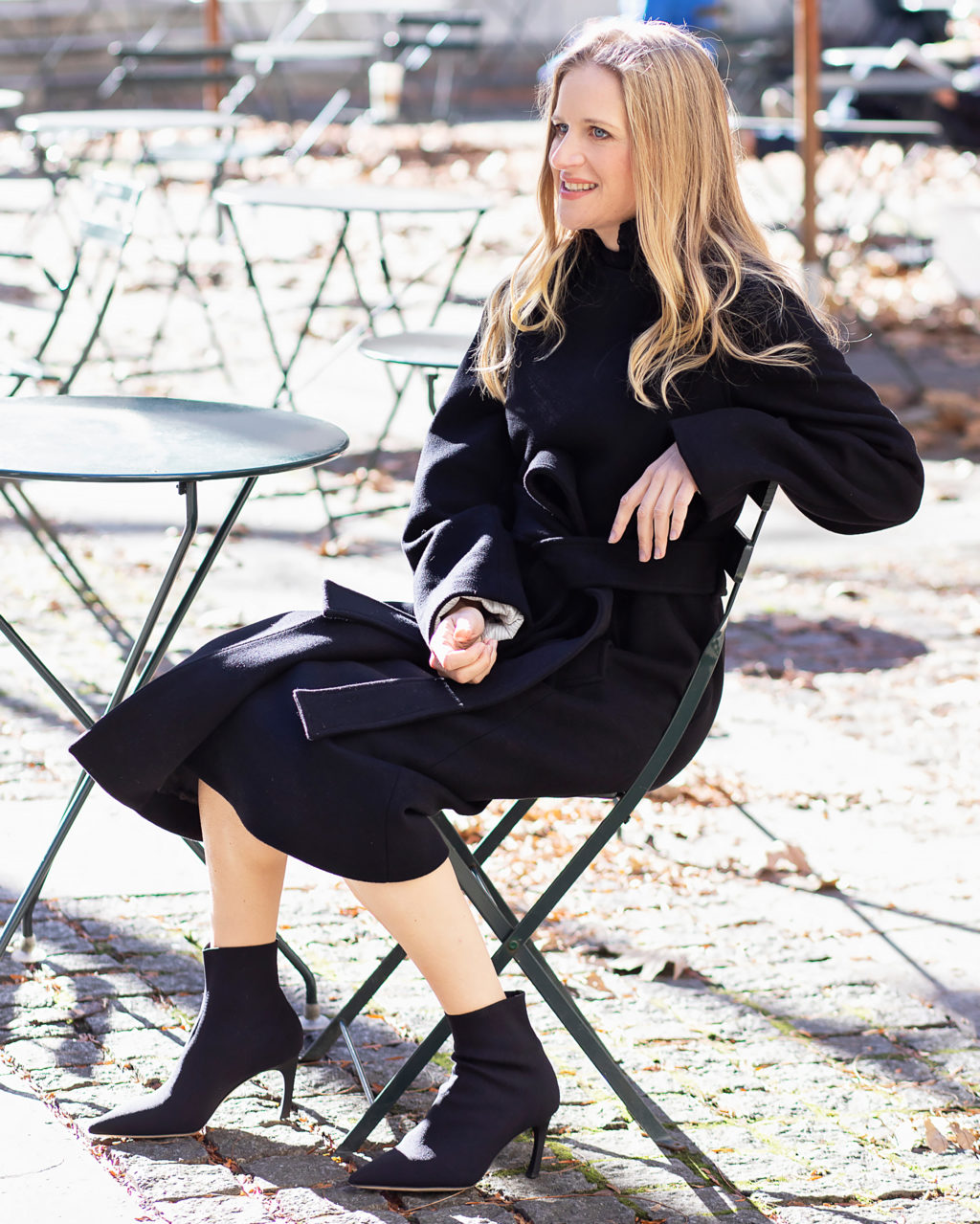
Emma wears the Niko dress, Vivara necklace, Sofia coat, and Lana boots.
MANY OF US HAVE BOUGHT INTO THIS IDEA that we need to be stressed to be productive. It’s a complete misconception. If you’re constantly in fight-or-flight mode, you’re depleting everything that you need for your attention, memory, immunity, and so forth. Short-term stress is meant to help you get away from danger, but if you’re stressed like that all the time, then you’re constantly depleting yourself. It’s why we’re seeing such high rates of burnout across all industries.
OVER-CAFFEINATING IS JUST ONE EXAMPLE of the ways people get their fight-or-flight response going constantly. Ironically, if you stop drinking so much coffee, you will have much more energy, which is revolutionary. Whenever I say this, people think I’m trying to get between them and their coffee, and they get very upset. But don’t you want more energy? Then you can’t be in fight-or-flight mode all the time.
I USED TO HAVE THIS SUPER BLISSFUL MORNING ROUTINE. I would get up, do yoga for 20 minutes to an hour, and then do 20 minutes of breathing and 20 minutes of meditation. Now, I usually get yanked up by my kids around 4:00 or 5:00 A.M. and I don’t get to my practice until they’re dropped off for the day. I haven’t been able to find time for yoga, but I still do 20 minutes of the breathing practice and 20 minutes of meditation. Then, before bed, I’ll do another 15 or 20 minutes of meditation. If I don’t do that, I’ll be tossing and turning for 20 minutes anyway, so why not meditate first and then go right to sleep?
TO MAKE MEDITATION A HABIT, tell yourself you’ll do it for 30 days and then you can quit. Every morning, get up, shower, have a glass of water and then sit and meditate for 10 minutes before you go to work. Once you do it for 30 days, you can decide to keep doing it—or you can go back to immediately jumping into email and getting stressed and having 12 cups of coffee every morning, if that’s what you want. But you might be surprised by the results.
Photography by Sarah Kerens. Styling by Shanna Engelhardt.





